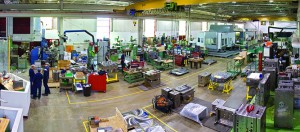
DBM Reflex: the difference you can see
By Luc Boily, editor of Plastiques et moules
Automotive MoldmakingQuebec-based company offers in-depth expertise in the machining and manufacturing of molds for optical components and the molding of optical components.
The recent integration of LED technology to automotive lighting has led to increased demand for plastic lenses (PMMA or PC). These lenses pose a formidable technological challenge due to the imposing wall thickness and high optical quality they require. Furthermore, they require very precise geometric tolerances and high polished surfaces, with imaging being sometimes necessary. The expertise developed by DBM Reflex for the past 44 years has naturally led them to specialize in this sector and to provide clients in over 20 countries with products of unrivalled precision and quality. “Our team of 300 employees in Laval stands out for its in-depth expertise,” says Bernard Caire, P. Eng., Vice-President of Sales. “We also have 10 employees overseas. Our main markets are the United States and Europe, but we are also very active in South Korea.” Furthermore, a sister company was established in Asia in 2000: DBM Reflex of Taiwan.
CONTINUOUS R&D
In order to keep up with the latest technological requirements, the company’s research and development (R&D) center – continuously active in its actual location on Dagenais West Boulevard – has developed and patented the Dual-Step technology, which effectively combines thick wall molding and superior optical quality. In addition to allowing the molding of plastic optical components at a low cost for the automotive industry, this technology ensures very low cycle times. It also allows integrate thick wall components with other, thinner elements: a definitive advantage.
The company owns several other patents, including Vari-Flex and Super-Pin, which allow engineers to combine style, performance and expertise into the electroforming process and effortlessly create retroreflectors that meet the latest trends in shape and innovation. All of its molds are designed and produced on site, which is also where all component testing and tuning is performed. A photometer is also used to measure and control retroreflector performance during testing or production. A goniometer laboratory for photometric validation is also available upon request.
In fact, all of DBM Reflex’s activities happen under a single roof: from surface treatments to diamond machining of optical elements and microstructures. The company has also developed its own injection presses in partnership with a leading manufacturer.
A NEW COMPANY
In keeping with its goal of always offering more to its clients, a new company was established last year: DBM Optix Inc. Its mission consists in manufacturing the most technologically complex optical components in order to meet the ever increasing requirements of manufacturers, always within specified timeframes. A new 55,000-square-foot building is currently under construction and the opening is planned for the middle of this year. Clients will be able to benefit from the latest breakthroughs in optical simulation, as well as cutting-edge machining and molding equipment. DBM has also developed simulation software called Simoptic, specifically designed for developing and improving light-signalling systems. Depending on the client’s needs, feasibility reports can include lit-appearance images and photometric charts based on SAE and ECE standards.
The Laval-based company is also a wise choice when it comes to tooling for critical optical applications. For example, thanks to its diamond cutting centers, DBM is capable of offering exceptional surface finishes down to Ra 0.01 micron. Free form surfaces can also be machined with final optical finish requiring no other polishing (manual or mechanical) or process. Finally, optical microstructures (4 micron amplitude) can be machined on these same surfaces. “I would say that our expertise rests on two complementary aspects that differentiate us from other players in the industry and are appreciated by our clients: our knowledge of machining and manufacturing specialized molds for optical components on one hand, and molding on the other,” observes Mr. Caire.
CERTIFICATIONS AND ACHIEVEMENTS
In addition to ISO 9001 certification, a popular standard for quality management, the company has received ISO TS16949 certification in 2013. This international standard defines requirements for quality management systems for the development, design, production, installation and maintenance of products related to the automotive industry.
In 2014, DBM Reflex was recognized in the Society of Plastics Engineers’ 44th automotive innovation awards competition for its design of the first thick wall plastic collimator compatible with automotive LED lighting systems. This collimator will be mounted on all Ford F-150 trucks equipped with LED headlights.
Finally, given the significant increase in demand for complex inserted optical elements in the last few years, as well as the opening of DBM Optix’s new building in 2015, Mr. Caire has every reason to be enthusiastic about the company’s future.

